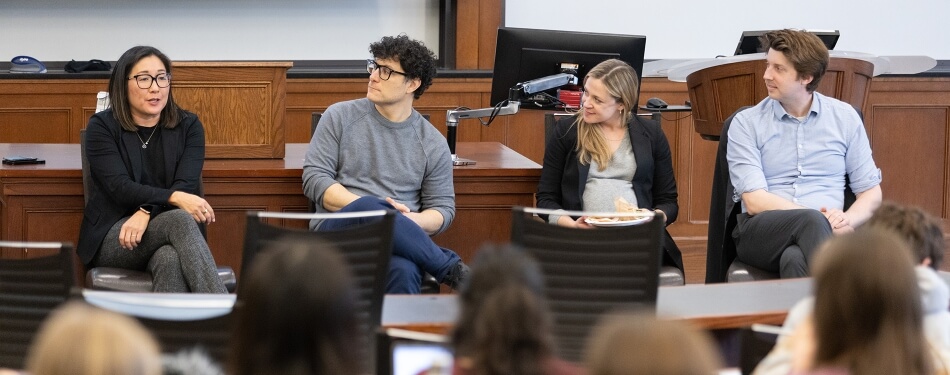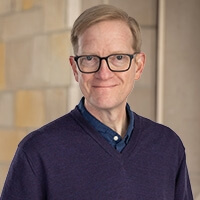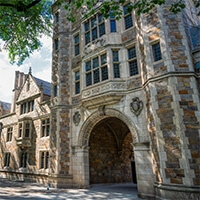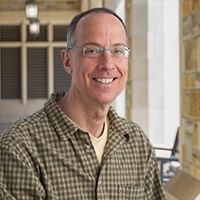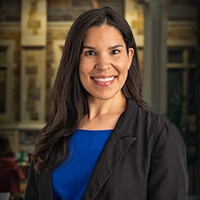The Law School recently welcomed lawyers from the world of public interest law to its second annual Public Interest Week. They shared their stories and advice during a series of events, providing an important source of insight for Michigan Law students who want to learn more about this area of the law.
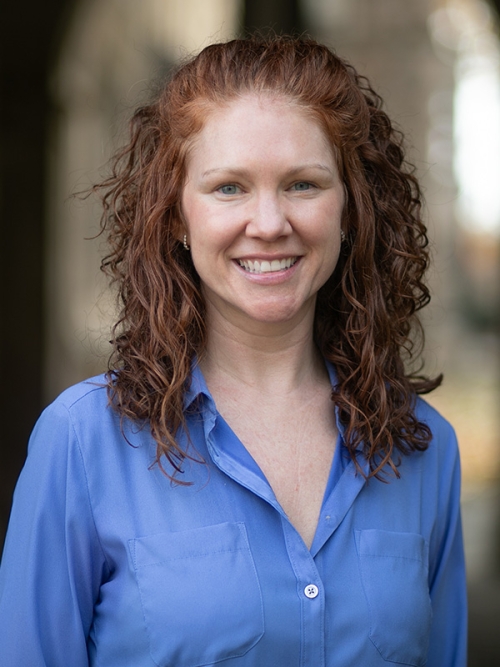
“Public interest week is so important for so many reasons,” said Emily Bretz, ’11, Michigan Law’s public interest director.
“First, the sense of community. It can be challenging to be a public interest student—the path to employment isn’t as clear, and there is less postgrad job security, not to mention the obvious financial considerations. But PI week brings together students, alums, faculty, and staff with the goal of supporting PI students and making it clear how strong the Michigan Law community is.”
In addition, it provides students with information about what it means to be a public interest lawyer. By hearing from various speakers and alumni discuss their careers, students can start to make choices about their career paths.
And, Bretz noted, “It’s a chance to help people remember the reason they came to law school—to help people. There is so much good to be done in the world, and at a time when it’s easy to feel discouraged, I hope that PI Week reminds us all that we can make a difference.”
The week’s events included alumni panels that centered on public interest lawyering and clerking for public interest students as well as a breakfast for students, faculty, and staff; a pro bono fair; and an international externship information session.
Rounding out the week’s events were addresses by Nancy A. Parker, executive director of the Detroit Justice Center (DJC), and Lee Gelernt, deputy director of the ACLU Immigrants’ Rights Project.
Here are four takeaways from their presentations.
1. Decide how to leverage your prestigious law degree
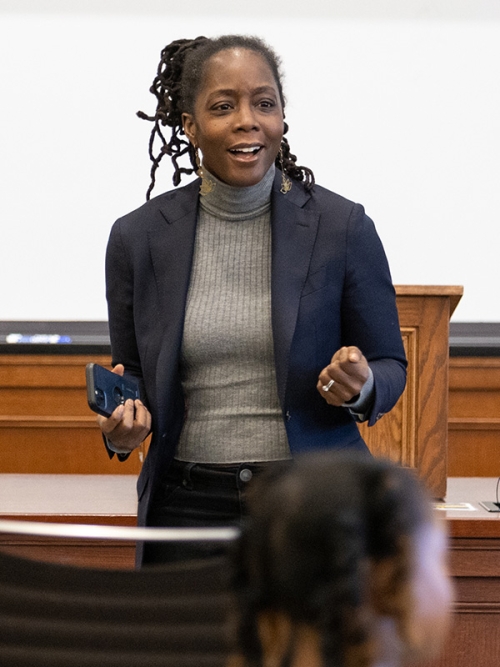
In her kickoff address, Parker retraced her own experience and career path.
After earning her undergraduate degree from Michigan and graduating from Washington University School of Law in 2011, she went to work in Pittsburgh for the United Steelworkers International Union as assistant general counsel.
The 2014 police killing of Michael Brown in Ferguson, Missouri—just down the street from her law school alma mater—and, later, the rise of the Black Lives Matter movement, had a profound impact and led her to evaluate her career.
As a result, she went to work for the DJC, a nonprofit law firm where she deals with questions of justice on a daily basis and works to empower communities.
“This is what we firmly believe: No one is coming to save us,” she said.
“‘We are the leaders we have been waiting for,’” she added, quoting the late Detroit activist Grace Lee Boggs. “That’s a mantle for each and every person—lawyers, nonlawyers, clients.” She said that message takes form at DJC in a three-pronged approach:
- Defense: working with clients who face immediate legal issues, such as traffic tickets, fines, and warrants, which can often be impossible for them to pay, appear on their criminal record, and thus have the potential to upend their lives.
- Offense: DJC’s economic equity practice that allows clients to develop projects such as community land trusts and worker-owned cooperatives that provide solutions to food deserts.
- Dreaming: envisioning what fair and just cities look like without the current version of the carceral system and how to make change happen.
She then challenged the students as they chart their own career path in public interest law.
“You will walk out of here with a very prestigious degree,” she said. “What are you going to do with it?”
2. Pick your lane
As Parker challenged students to find their path, she stressed that they need to be realistic in their expectations. As with any career path, they might find that no avenue is perfect and will have to figure out how they fit into the system with their specific set of talents, knowledge, and resources.
“Are you here because you want to make a difference? Are you here because you want to learn? Are you here to make money? What is it?” she asked.
“You have to pick your lane. It will not be easy, and it will not be a clear path.”
She also advised them to avoid a savior complex, which is a misplaced priority in the sphere of public interest law.
“But if you’re here because you believe you have as much to learn as you have to give back, then you’re in the right place. If you would like to share your wisdom and grow in the process, recognize that someone is where they are, not because they’re less than you but because of societal infrastructure— because of classism, sexism, racism, all of the ‘isms’ that create the society that we live in. Where will you step in and disrupt the system?”
3. Remember the power that lawyers possess
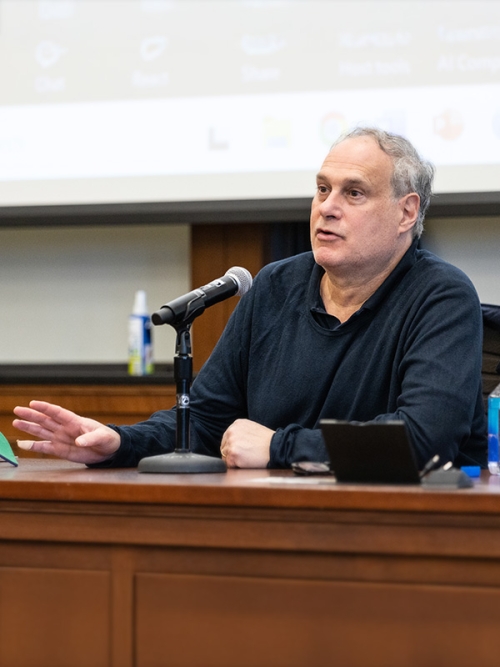
In light of injustices they see around them, the ACLU’s Gelernt reminded students of the power that lawyers possess in changing people’s lives and simply bringing comfort to clients who know that someone with power is on their side.
He recounted an interaction he had as a young lawyer with a client from El Salvador.
The community organizer he worked with described him to the Spanish-speaking client as muy importante abogada, a very important lawyer. Feeling that was an overstatement, he later reflected how much the client took comfort in his help.
“This 20-year-old woman was feeling so vulnerable that she needed to hear that someone was on her side; not just anybody, but a lawyer, was there just to help her,” he told the students.
“And I think you all need to remember that it’s easy to dismiss what it is to be a lawyer. They really need that assurance that someone is there to protect them.”
4. Don’t get overwhelmed by the big picture
Gelernt also advised the students not to feel daunted by big issues that are playing out around the country.
For example, as an immigration lawyer, he is discouraged at the prospect of millions of people facing deportation, an issue he has worked on his entire career.
“But I think one of the real mistakes people can make is thinking, ‘Well, this is just too big an issue. What am I going to do? I can’t stop it all.’ But put that aside. Do one thing. Help one family. Take one case. It really matters.”
While taking action in one area might seem small within the larger framework, it will make an enormous impact on that client. He added that while some of the high points of his career have been big and exciting, such as representing a client in the Supreme Court and testifying before Congress, the one-on-one interactions remain most memorable.
“Those are the moments I think I’ll remember with clients, just helping one person. So really try to not get overwhelmed by the sheer magnitude of everything, and just jump in, however you can, wherever you can.”
Banner photo: Law School alumni returned to present their perspectives on careers in public interest lawyering. From left to right are Frances Carlson, ’97, US Attorney’s Office; Ben Falik, JD/MPP, ’09, Lakeshore Legal Aid; Hannah Swanson, ’15, Planned Parenthood; and David Fegley, ’20, Salvatore Prescott Porter & Porter LLC.

